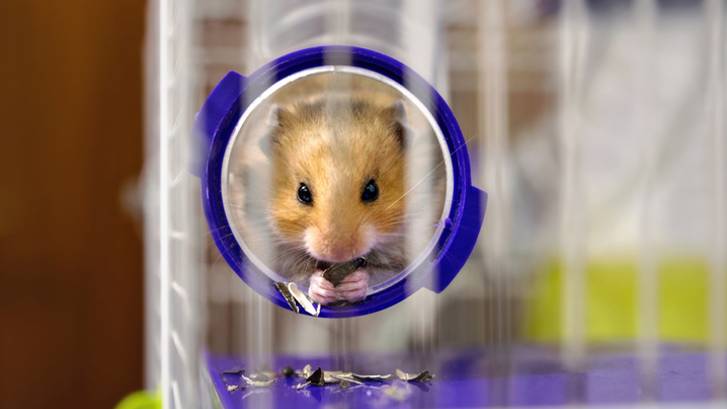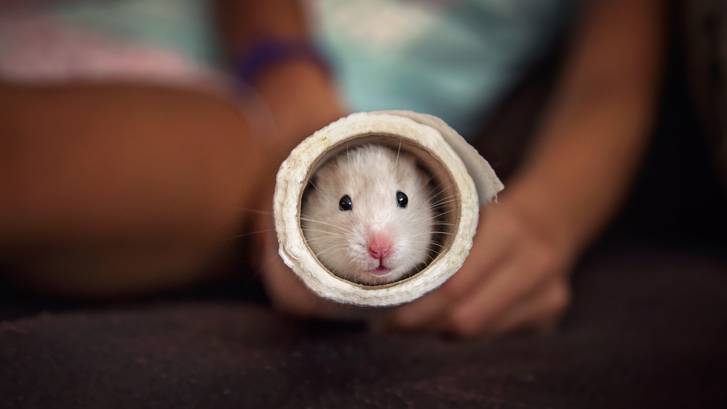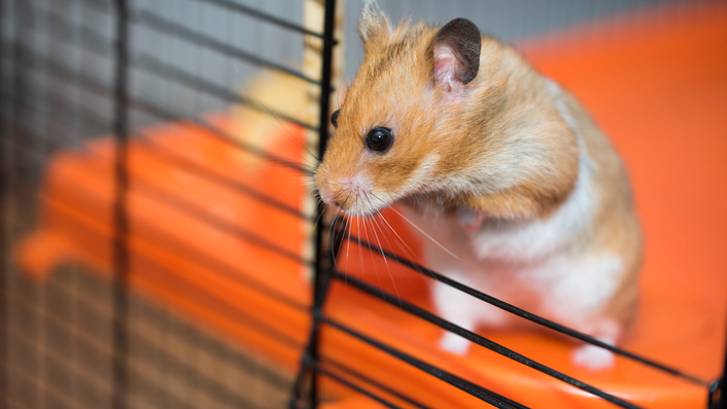Why is my hamster hiding from me? Causes and what to do
Is your hamster hiding from you? Find out if and when you need to be concerned…

Get the best advice, tips and top tech for your beloved Pets
You are now subscribed
Your newsletter sign-up was successful
If your hamster's hiding in its cage and you want to know whether you need to worry or not, this guide will tell you everything you need to know.
These curious little critters are natural burrowers and enjoy exploring small spaces. As prey animals, hiding in the corner of their cage, under their bedding, inside tubes and tunnels or even hiding their food is an instinctive behavior adapted to protect themselves and keep them safe.
While you generally do not have to be concerned if your hamster hides during the day time, hiding can be a sign of a problem. If their habits change and they are hiding excessively they could be telling you something is wrong.
Make sure they are in a happy environment and have enough space. A large, good quality hamster cage is essential, as is providing plenty of ways to keep your hammy stimulated including ensuring there's plenty of sawdust for digging, and nesting for sleeping, as well as plenty of hamster chew toys.
Follow the advice below and if their behavior doesn’t change, consult with your local vet.
- 5 reasons why your hamster is scared of you
- How big should a hamster cage be?
- How to bond with your hamster
- Why is my hamster biting me?
Do hamsters like to hide?
Hiding is a natural behavior for hamsters. They are typically shy creatures that instinctively like to burrow or conceal themselves out of sight. These curious mammals enjoy exploring the nooks and crannies of their cage, curling up in small spaces and hiding under objects.
This behavior has been evolved to help protect themselves and hide from prey, but it also makes them feel safe and gives them time and space to rest.
Get the best advice, tips and top tech for your beloved Pets

Why is my hamster hiding from me?
There are lots of reasons why your hamster may be hiding. While it may simply be exploring its natural burrowing behavior, discovering new spaces or hiding its food - a natural instinct to ensure it has enough to eat - it could be a number of reasons:
They're asleep
Hamsters are nocturnal animals which means they sleep during the day and are active at night. If your hamster is hiding during the day it could just be curled up to sleep or rest somewhere. If you're wondering, 'Do hamsters hibernate?', check out our feature that reveals the answer.
Stress
Your furry friend is a shy animal and may get stressed if its environment changes or it is disturbed. Watch to see if they hide when you or someone else enters the room. If you have recently moved home, changed its cage or introduced a new hamster or if your hamster is new to the family, it may take time to adapt and will hide away until it adjusts.
If you have children or other pets, you may want to keep your hamster in a different room. They may be hiding if there’s too much noise or the lights are being switched on and off constantly.
Aggression between hamsters
If you have more than one hamster make sure the pair get along. If one hamster is showing aggression towards the other, this could be another reason for hiding. In this case, you may want to separate them so that neither is stressed.
Breed
Just like us, different hamster breeds and individual hamsters have different personalities. If your hamster always hides this may be down to their breed or a personality trait. Some breeds such as the Dwarf and Chinese hamsters can be quite sociable, whereas the Syrian hamster is often aggressive if not kept alone.
Temperature
Hamsters like the warmth. If your pet is hiding and you’re not sure why try turning up your heating or invest in a heat lamp if you think they may want to be a bit more cozy.
Health issue
If none of the above reasons apply and your hamster’s behavior has changed, hiding could be a health issue. If they are lacking energy both day and night, take them to a vet to see if they are ill.

Where can hamsters hide?
Hamsters don’t only hide in their cage where you’ll find them curled up under their bedding, in the corner or inside or under their play structures. If they manage to escape the cage, you’ll want to know where to look to find them. Think small spaces.
Hamsters particularly like hiding inside or under furniture. Look under the bed or couch, inside closets or even inside cushion and pillow cases. Try searching shoe boxes, behind your entertainment system or somewhere warm like beneath a heater. They could even be hiding in the bathroom attracted by nice-smelling scents or the basement.
If you need to know how to find a lost hamster try these hiding places. You can also lure your pet in with their favorite snacks at the cage door.
Why is my hamster hiding in a corner?
Your hamster may hide in a corner to sleep, burrow or if it is stressed, but have you asked yourself why it chooses to hide in the corner of its cage. The answer is simple really. Corners provide more safety and as prey animals they instinctively look to protect themselves.
In a corner their back is up against the wall and there is nothing behind them that can pose a risk. If you recently got your hamster and they’re unsure of their surroundings, they will feel more comfortable in a corner. If they’re scared or stressed, they’ll feel more safe here.
How do you tell if a hamster is stressed?
There are a number of signs you can look out for that may indicate that your hamster is stressed.
Hamsters aren’t usually aggressive so if they start to show aggressive or repetitive behavior such as pacing or moving its bedding back and forth, they could be stressed. If their habits change, for example, if they are not eating or drinking as normal, if they’re climbing or biting their cage excessively trying to escape or hiding and sleeping more than usual, these could also be warning signs.
Stressed hamsters may freeze up, their teeth may chatter and they may not want to be held. If your pet is exhibiting any of these behaviors it’s time to visit the vet.

How to stop your hamster from hiding all the time
There are lots of ways you can get your hamster to come out of hiding:
Let them sleep
Your hamster will often hide if it wants to sleep. A tired hamster isn’t a happy hamster. Make sure they are able to sleep without interruption in a quiet room where lights aren’t being switched on and off all the time. Then when they’re awake they’ll be more sociable.
Keep them active
Just like any other pet hamsters need physical and mental stimulation so they don’t get bored and become destructive or stressed. It’s important to make sure your hamster has space to run and play, as well as structures to keep them stimulated such as a climbing tube, hamster wheel or activity ball. If they are kept busy and happy they won’t feel stressed so shouldn’t hide as much.
Give them space
As well as playtime, they need to be kept in a stress-free environment. This means buying a large, recommended cage to ensure they have enough space depending on the breed and appropriate bedding.
Undisturbed environment
Hamsters don’t only need a large cage and toys to play with, but depending on your pet’s personality it may need a quiet, warm room and another hamster for company. Check your pet’s environment to make sure they are happy.
Time to adjust
If you’ve recently adopted your hamster, don’t be surprised if they’re shy and don’t want to be held. Make sure you give them time to settle in and adapt to this change and give them space. Soon they will come out of hiding.
Entice them with food
If all else fails you can try the “bucket method”. Place treats such as sunflower seeds, fruit and raisins in a small bucket and stack books up next to it so that your hamster can climb up and forage for its food.
Amy Davies is a freelance writer and photographer with over 15 years experience. She has a degree in journalism from Cardiff University and has written about a huge variety of topics over the years. These days she mostly specialises in technology and pets, writing across a number of different titles including TechRadar, Stuff, Expert Reviews, T3, Digital Camera World, and of course PetsRadar. She lives in Cardiff with her dog, Lola, a rescue miniature dachshund.

